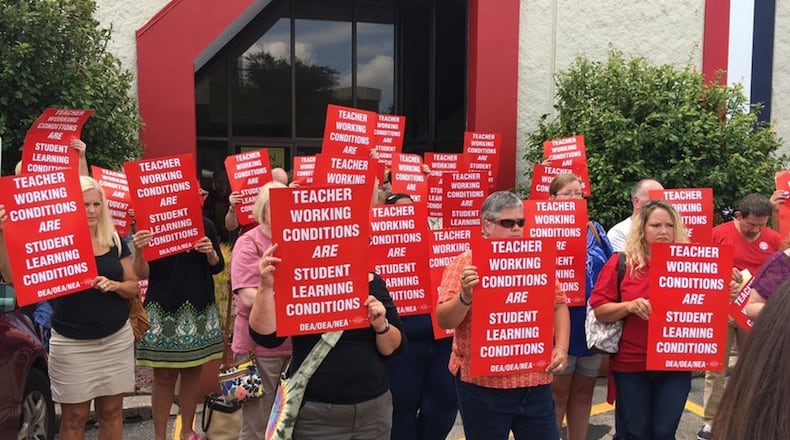Dayton teachers union President David Romick said Tuesday that he classified “all of the issues remaining on the table as issues of respect for Dayton teachers.”
MORE: Teachers, Dayton school leaders prepare for strike
If the two sides don’t reach a tentative contract agreement by Aug. 11, the union will go on strike. Along with negotiations about health insurance, here are some of the other key issues that still divide the teachers and the district:
Pay
The union feels that Dayton’s current teacher salaries are “not competitive” and have contributed to high staff turnover in the district.
“We are attempting to make them more competitive and to stem that turnover, which is not good for children,” Romick said.
Starting salaries in Dayton ranked 14th of 45 area districts in 2015-16, as teachers starting with a bachelor’s degree earned $37,336 per year, just above the area’s median of $36,400. Long-term amounts were less competitive, however, as DPS’ most experienced teachers with a master’s degree would earn just over $66,000. That maximum master’s salary ranked 38th of those 45 districts, with most districts falling between $61,000 and $85,000.
MORE: How much do teachers make in area school districts?
Additional staff
Teachers have lobbied for the addition of school staff members who would provide guidance for students beyond the basic classroom. They have pushed for the district to hire additional guidance counselors and library staff members, among other positions.
Romick said that the middle schools and elementaries had no counselors last school year. Romick also said that more ELL (English language learners) teachers are needed, given the influx of refugee students that the district has seen.
The district has four people acting in library media roles, spread across four high schools. DPS also has 12 certified school counselors, spread across seven schools, according to school officials.
“We are working to find a model that is fiscally responsible and creates access and availability for all of our students in every school building,” district HR director Judy Spurlock said in May of the library issue.
RELATED: Dayton teachers on verge of strike: 7 things we know today
Teacher planning time
Teachers and the district have argued about teacher planning time during the negotiation period. Romick said in June that teachers need an increased amount of planning time.
“With all the requirements that have been heaped on teachers by the state, teachers need an increased amount of planning time,” Romick said.
Time clocks
Romick called it disrespectful that the district planned to require teachers to “clock in” via thumbprint time clocks and actually installed the devices in schools while negotiations were ongoing.
Corr said she understands the union’s position about that plan, which was in the works before she arrived. She plans to talk to the school board about it. She called the teachers “absolute professionals” and said if teachers were eventually required to clock in, she would require her central office staff to clock in, too, and would do so herself.

